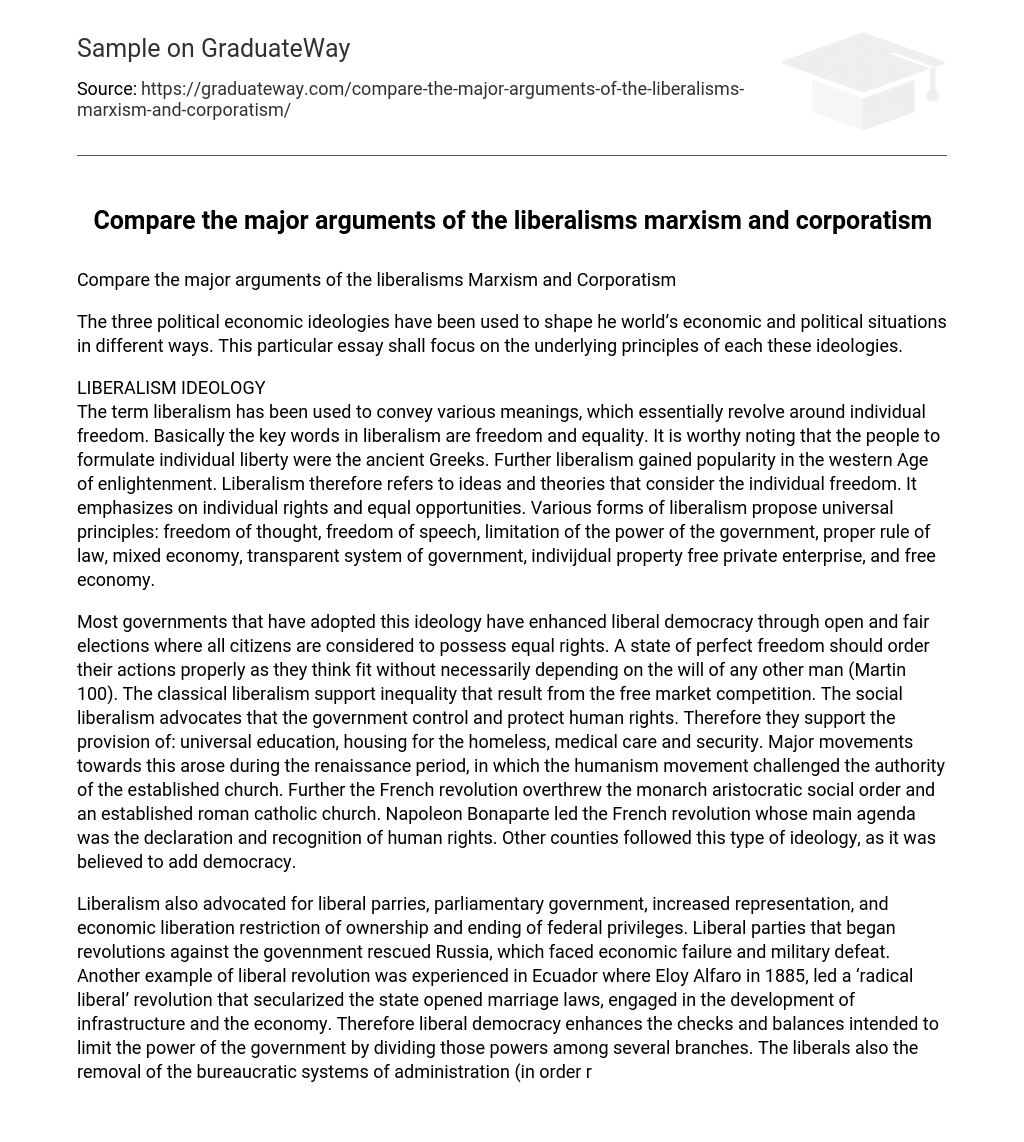The three political and economic ideologies have been used to shape the world’s economic and political situations in different ways. This essay will focus on the underlying principles of each of these ideologies.
LIBERALISM IDEOLOGY
The term liberalism has been used to convey various meanings, all of which essentially revolve around individual freedom. The key words in liberalism are freedom and equality. It is worth noting that the ancient Greeks were the first people to formulate the concept of individual liberty. Furthermore, liberalism gained popularity during the Western Age of Enlightenment.
Liberalism refers to ideas and theories that prioritize individual freedom. It emphasizes individual rights and equal opportunities. Various forms of liberalism propose universal principles such as freedom of thought, freedom of speech, limitation of government power, proper rule of law, mixed economy, transparent system of government, individual property rights, free private enterprise and a free market economy.
Most governments that have adopted classical liberalism have enhanced liberal democracy through open and fair elections, where all citizens are considered to possess equal rights. According to Martin (100), a state of perfect freedom should enable individuals to order their actions properly as they see fit without necessarily depending on the will of any other person. Classical liberalism supports inequality that results from free market competition, while social liberalism advocates for government control and protection of human rights. Therefore, social liberals support the provision of universal education, housing for the homeless, medical care, and security.
Major movements towards this ideology arose during the Renaissance period when the humanism movement challenged the authority of the established church. Furthermore, during the French Revolution, monarch aristocratic social order was overthrown along with an established Roman Catholic Church. Napoleon Bonaparte led this revolution whose main agenda was to declare and recognize human rights. Other countries followed this type of ideology as it was believed to add democracy.
Liberalism advocated for liberal parties, parliamentary government, increased representation, and economic liberation through the restriction of ownership and ending of federal privileges. Liberal parties that began revolutions against the government rescued Russia, which faced economic failure and military defeat. Another example of a liberal revolution was experienced in Ecuador where Eloy Alfaro led a ‘radical liberal’ revolution in 1885 that secularized the state, opened marriage laws, engaged in the development of infrastructure and the economy.
Therefore, liberal democracy enhances checks and balances intended to limit the power of the government by dividing those powers among several branches. Liberals also advocate for removing bureaucratic systems of administration to reduce spending on long bureaucrats. Additionally, they support eliminating tax rates over 100% so as to allow poor individuals to keep what little they earn. The best method for administering is through universal welfare consideration which consequently reduces dependency on government.
MARXIST IDEOLOGY
This is a theory that considers society to be divided into strata. It is both a theory and a political practice based on socialism or communism. The major proponent of this theory, Karl Marx, observed that society is determined by the distribution of material resources, creating different classes. Marx discouraged the existence of a capitalist society and affirmed that it should be replaced with a socialist one (Marx 45). Under this ideology, there are three major classes: lower, middle, and upper.
The capitalist society is characterized by a free market economy, private property, parliamentary democracy, monopolistic tendencies, and warfare. In this ideology, parliament is supposed to pass laws that protect the wealthy and their interests. Additionally, capitalists often use threats of war to control people. The underlying principles of socialism include a decentralized planned economy, common property ownership, and democracy. These principles can be achieved through class-consciousness and the struggle to end the destructive nature of capitalism for success.
The end result of such a struggle is the elimination of classes, government, nation, and money.
This ideology, which emphasizes common ownership and democratic control of the means of production, has been practiced in North Korea. This eliminates struggles for materials and liberates people from exploitation by capitalists.
CORPORATISM
Corporatism is a theory that emerged in the 19th century as a response to the competition and class conflict within capitalist societies. Its aim is to reduce the power of individuals and merge state and corporate leadership under an authoritarian rule. The ideal corporate state, according to this theory, is one where groups rule. This means that the state is organized into subordinate corporations.
This text discusses the intersection of liberalism and Marxism in theory and practice. Turkey serves as an example of a country that has implemented corporatism, where the government is characterized by culturally pluralistic rule and solidarity. The people are expected to accept certain ideas as true (Draper 68). In Turkey, Kemalism is upheld as the ideal form of leadership through legal, constitutional, and social means. Kemal is revered as the eternal chief, grand leader, and father figure for all citizens. This ideology demands obedience without much questioning from the masses.
Bibliography.
Draper, H. – The Adventures of the Communist Manifesto: Centre for Socialist History.
Berkeley, 1994.
Martin, B. French Liberal Thought in the Eighteenth Century. London: New Edition, 1954.
Marx, K. A Contribution to the Critique of Political Economy. Moscow: Progress Publisher.
1848.





